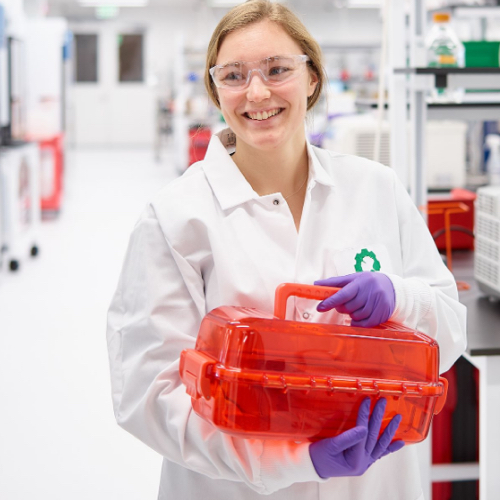BiomEdit intends to leverage Ginkgo’s platform to discover and develop microbiome-based animal health products to improve animal health, animal protein production, and livestock disease monitoring.
We’re excited to announce the launch of BiomEdit, a microbiome innovation company that is expected to discover, develop, and introduce novel probiotics, bioactive molecules, engineered microbial medicines and microbial monitoring services for animal health.
Microbiome science is a rapidly growing field creating breakthroughs in animal health based on the microbial communities that live in animals and their surrounding environment. BiomEdit intends to discover, develop and introduce differentiated products that address some of the greatest needs for innovation in animal health, including medicated feed ingredients, nutritional health and therapeutics for livestock and pet species, as well as biosecurity technology for animal disease monitoring.
BiomEdit is Ginkgo’s latest platform venture, created in partnership with Elanco Animal Health — a leading global animal health company.
In October 2021, Elanco announced its intention to carve out its microbiome platform and pipeline under the leadership of Aaron Schacht, BiomEdit CEO and former Elanco executive vice president of Innovation, Regulatory and Business Development, to concentrate and focus more resources on its high value late-stage Pet Health pipeline. BiomEdit is the result of this separation, and was developed with Ferment Co., the company creation studio that helps ideate and launch new companies across a variety of end-markets that use cell programming to support human and environmental health and well-being.
Elanco will contribute intellectual property and a pipeline of ongoing programs to BiomEdit, which will be staffed with members of the former Elanco microbiome R&D team. The team brings the expertise and experience needed to build on the foundation of microbiome work started at Elanco. By leveraging foundational programs from Elanco, intellectual property from both Elanco and Ginkgo, and an experienced team, BiomEdit should be well positioned as a stand-alone company to develop and launch innovative products to address unmet needs in animal health.
“Livestock producers and veterinarians are calling for new products that address antibiotic resistance and improve livestock sustainability,” said Mr. Schacht. “Coupling the platform, pipeline and deep expertise of the former Elanco microbiome team with Ginkgo’s unique screening and strain engineering capabilities will accelerate and amplify our ability to advance novel animal microbiome inspired products for animal health.”
“Elanco is excited to continue its participation in the microbiome by partnering with Ginkgo, Viking Global Investors and Anterra Capital to create the next-generation animal health innovation player,” said Jeff Simmons, president and CEO of Elanco Animal Health. “We wish Aaron and his team the best as they build out this novel innovation platform to address unmet needs in animal health, such as alternatives to antibiotics.”
Ginkgo has significant expertise in the discovery, design and monitoring of microbes at scale for a wide array of functions.
BiomEdit plans to leverage Ginkgo’s state-of-the-art cell programming platform to improve the design and development of probiotics, bioactives, engineered microbial medicines, and microbial monitoring services. BiomEdit joins other Ginkgo platform ventures such as Joyn Bio, Motif FoodWorks, Allonnia, Arcaea, Verb Biotics and Ayana Bio.
We are always on the lookout for opportunities to accelerate our partners’ abilities to address massive challenges, such as antibiotic resistance in livestock. Together, we see Ginkgo and BiomEdit addressing significant opportunities in the animal health industry with new breakthroughs based on microbiome science. We deeply depend on the health of animals in our ecosystem and supply chains; the potential applications for our cell programming platform in this area are far reaching.
In addition to the assets and intellectual property contributed by Elanco and Ginkgo, BiomEdit is launching with a targeted Series A funding raise of $40 million, with participation by Viking Global Investors and Anterra Capital. In exchange for their respective asset and intellectual property contributions, Elanco and Ginkgo are expected to retain approximately 40% combined proportional ownership of BiomEdit, on a fully-diluted basis, upon the completion of the Series A financing. Elanco’s ownership will be in non-voting shares.
J.P. Morgan Securities LLC acted on behalf of Elanco as sole placement agent on the financing.
Find the full press release here along with all of the latest news from the Ginkgo team.
